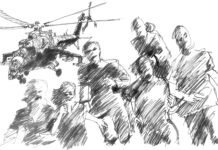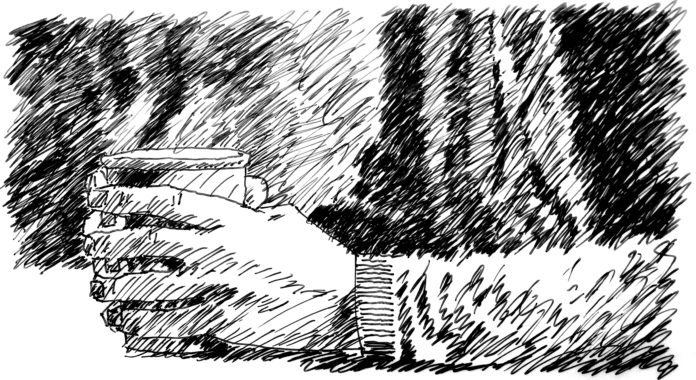By Ted Leonhardt
The fantasy continues…
“You promised us we’d win Unilever.”
“That’s a child’s response. Grow the fuck up.” That’s how Brie’s Thursday began at Overture. “I shouldn’t have been so cocky” thought Brie. “I should have been more measured.”
Rough patch.
Sitting in her office, hands wrapped around her second cup, Brie remembered the feelings: First there’d been the rush of being a finalist on Unilever. Now it’s hard to recall that rush of pleasure. God we were in it! It was down to us and Deloitte! IDEO, Accenture/WPP, Bain and IBM were out!
Mark said we stood apart from day one. He’d know. He’d been with Unilever for years and had seen all the presentations.
Sitting here, holding my tea, remembering the transient touch of pride. Ears pounding with the pressure from my own heart. I had been so happy. Finally we had an opportunity for a contract that rivaled our General Motor’s engagement.
But it didn’t happen.
Brie stood, leaving the comfort of the warm cup.
Fucked
Over the following month, they lost some of their best people. Worse, several left to join the Deloitte team that had won Unilever.
From the beginning, Overture’s founders had relied on the values of their worker-self-directed enterprise to attract and hold talented creatives and clients. Now, with their second-generation management team in place and the success with GM, they’d been pursuing much bigger opportunities.
“Brie, Brad just gave me his notice.” Ryan was distraught. “He said that Deloitte’s offer was just too big to refuse. They doubled his salary and put him on the fast track to partnership.”
Brie reflected for a moment; Brad was one of their best. Was it really just about money? Or was there something else.
“What else did he say? Has he been his usual good-spirited self lately? Something else bothering him?”
People are torn between wanting to be in the group and their personal success. Part of an ancient tug-a-war between individual and group.
“Well he was questioning the wisdom of dropping our ‘Group Visioning’ presentations a few weeks ago.” Ryan thought some more, “And before that—maybe months ago—now that I think about it, he was upset with the reduced profit pay-out at the quarterly meeting.”
“That’s right, I remember he was questioning the numbers. Thought we were being too conservative with our forecasts. There it is,” thought Brie, “all the signs were there. And I dismissed them. Too focused on winning the next big thing.”
Time to get a grip.
Next
The GM contract—still ongoing, still successful—was too much of their revenue and they hadn’t landed any other clients as large or as influential on the global stage. Yes, Overture had won lots of smaller clients and had grown significantly over the last few years, but the big wins hadn’t materialized. Unilever, which Brie thought would be a shoo-in, drove the point home.
“Ryan, it’s time for a full Overture meeting. I need to apologize for my misdirected focus, acknowledge our people losses and lay out a new plan for success. I need to ask for a vote of confidence. If that doesn’t materialize, I’ll step down.”
Ryan grabbed her shoulder.
“Drop the self-pity, Brie. It’s wrong. It’s not pretty and it’s a loser’s game. If nothing else, you’re not a loser. We came from out of nowhere and toppled giants in the process. You know as well as I do that, we won the hearts of what must be close to half of Unilever’s Board. That’s not chopped liver.”
The meeting
Brie still could feel Ryan’s grip on her shoulder as she stepped in front of her Overture peers.
“We’re a worker-self-directed enterprise. I was elected by you to lead as chief executive. We’ve lost 11 people in the last six weeks. Some of our best. Some to Deloitte. That’s a real wake-up call for me—and I suspect for you as well.
“We’ve not been able to win another client that matches GM in size or in significance of engagement. I felt, and I know that many of you felt, that Unilever would be the breakthrough win. Sadly it wasn’t.
“If you feel that my leadership is no longer moving us forward, I’ll support a midterm election to fill our CEO position.” Brie spoke these words with humility and strength. Deeply sad that they had to be said at all.
“Okay, so what now?
“We won GM for two primary reasons. First, we knew that the auto-manufacturing industry was under tremendous pressure to change. GM and Ford, and the other remaining U.S. manufacturer, both already had undertaken major changes. Second, we knew our ‘Group Visioning’ theater-in-the-round presentation was ready for prime time and that unveiling it at the Detroit Auto Show was a way to directly reach senior management.
“Many of you participated in those presentations and remember the response we got. It was thrilling and a little overwhelming. And we got some immediate new business from some of the industry suppliers. It took a few weeks, but then GM called, and the rest is history.
“I propose that we once again survey industries, focusing on those that are under the most pressure to change, and build an exploratory response to the challenges they face, just like we did with autos, and engage them through whatever channels that are available for reaching their management.”
With that, Brie went silent and scanned the room.
The waiting is always the hardest.






